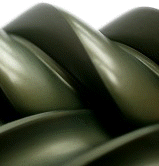 Supercharge your performance
Supercharge your performance
TWIN SCREW KOMPRESSORS
HUFF AND PUFF
| The principal requirement to
produce power in the internal combustion engine is to combine a precise
mixture of clean oxygen and fuel, then igniting this mixture. This ignition leads to a rapid rise in temperature as the mixture burns, pressure increases rapidly and forces the piston down the bore. Hence power is produced. The horsepower and torque output is directly proportional to the rate at which the mixture enters the combustion chamber. In other words, it is the density (or weight) of the charge which determines the power output. |
Regardless of pressure, an engine responds to density. Therefore the more mixture that can be crammed into the cylinders, the greater the potential horsepower output will be. With conventional tuning methods we aim to improve airflow by modifying cylinder heads with large valves, camshaft profile changes coupled with multiple carburettors or fuel injection and high compression etc. etc. There is an even more efficient tuning method! |
The SUPERCHARGER is back -
BETTER THAN EVER
With conventional tuning
methods we aim to improve airflow by modifying cylinder heads with large
valves, camshaft profile changes coupled with multiple carburettors or
fuel injection and high compression etc. etc.
There is an even more efficient tuning method!
Forced induction is not
new to the automotive world. It was used in the early 1900's and gained
much respect pre WW1 with Alfa Romeo, Auto Union and Mercedes fielding
Grand Prix racing cars with forced induction.
Following further development during WW2 Supercharging became a popular
bolt-on kit for many vehicles. In particular the MG T-Series XPAG engine
was the basis of many kits sold in the fifties.
SUPERCHARGER types
| There are two distinct types
of mechanically driven supercharger - the blower and the kompressor. A typical blower is the Roots type where, basically, two figure eight section rotors run in opposite directions. Air is drawn in one side and blown out the other. The air passing thru' does not alter in pressure as it passes thru'. In fact the inherent heat gain causes a loss in air density. Centrifugal blowers are basically an impeller (or fan) with radial vanes spinning within a casing. Typical of this type is the Shorrock supercharger which was a very popular bolt-on kit in the fifties and early sixties. |
Whilst generally more efficient than the Roots type they are particularly suited best in applications operating in a limited rev. range. |